By: Ted Dabrowski and John Klingner
Every year, states across the country compete with each other for people and their wealth as millions of Americans move between states. The stakes are large. A growing population for the winners means an increasing tax base, economic growth and investment. For the biggest losers, it means more difficulties in paying down debts, higher taxes and fewer investments for the future.
The nation’s most-recent winners of migration from other states are Florida and Idaho. Florida, the nation’s perennial winner, gained the most people and income overall in 2019, while Idaho gained the most of both on a percentage basis.
On the other end of the competition are states that have become perennial losers. States like California, New York, Illinois and New Jersey once again experienced some of the nation’s biggest losses of both residents and their money.
Those findings are based on a Wirepoints’ analysis of the latest 2019 domestic migration data provided by the Internal Revenue Service. The IRS reviews tax returns annually to track when and where people move. It also aggregates the ages, income brackets and adjusted gross incomes of filers.
Winners and losers
The Sunshine State attracted over $34.4 billion in Adjusted Gross Income (AGI) from 558,096 new residents (tax filers and their dependents) that moved into Florida in 2019. On the flip side, Florida lost $15.6 billion in AGI from 431,307 people who left. Overall, Florida came out ahead with 126,789 net new people and $17.7 billion in net new taxable income.
That’s a total gain of about 2.7 percent of the state’s total 2018 AGI ($661 billion).
Texas was the runner up with a net income gain of $4.0 billion, followed by Arizona with $3.8 billion. North and South Carolina rounded out the top five with net gains of $2.8 billion and $2.6 billion, respectively.
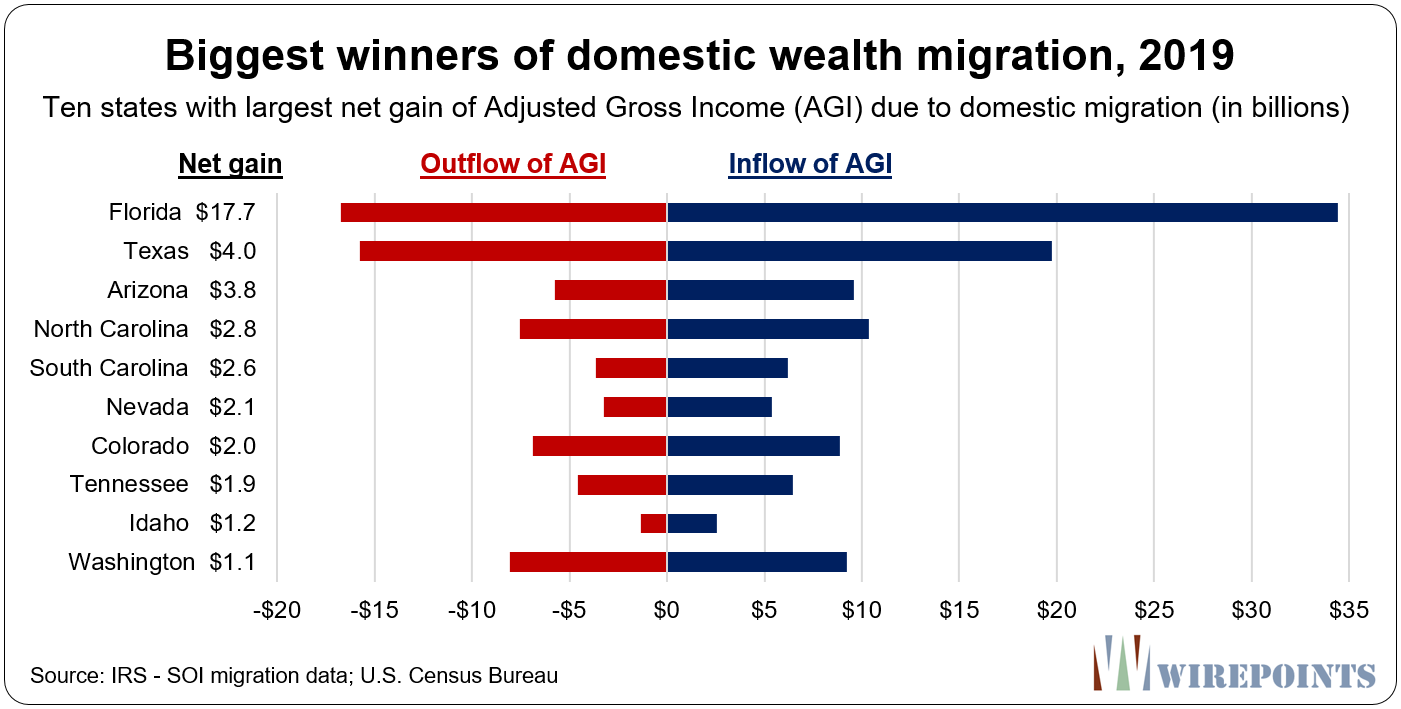 On the losing side, New York suffered the worst outflow of money of any state in 2019. The Empire State lost a net $9 billion in income, or more than 1.15 percent of its 2018 AGI, while a net of nearly 153,000 residents moved out.
On the losing side, New York suffered the worst outflow of money of any state in 2019. The Empire State lost a net $9 billion in income, or more than 1.15 percent of its 2018 AGI, while a net of nearly 153,000 residents moved out.
California was next, losing a net $8.8 billion and 165,000 people. Illinois was third with a net loss of $6.0 billion and 82,000 people. New Jersey and Maryland were in 4th and 5th place, with $3.1 and $1.8 billion in income losses, respectively.
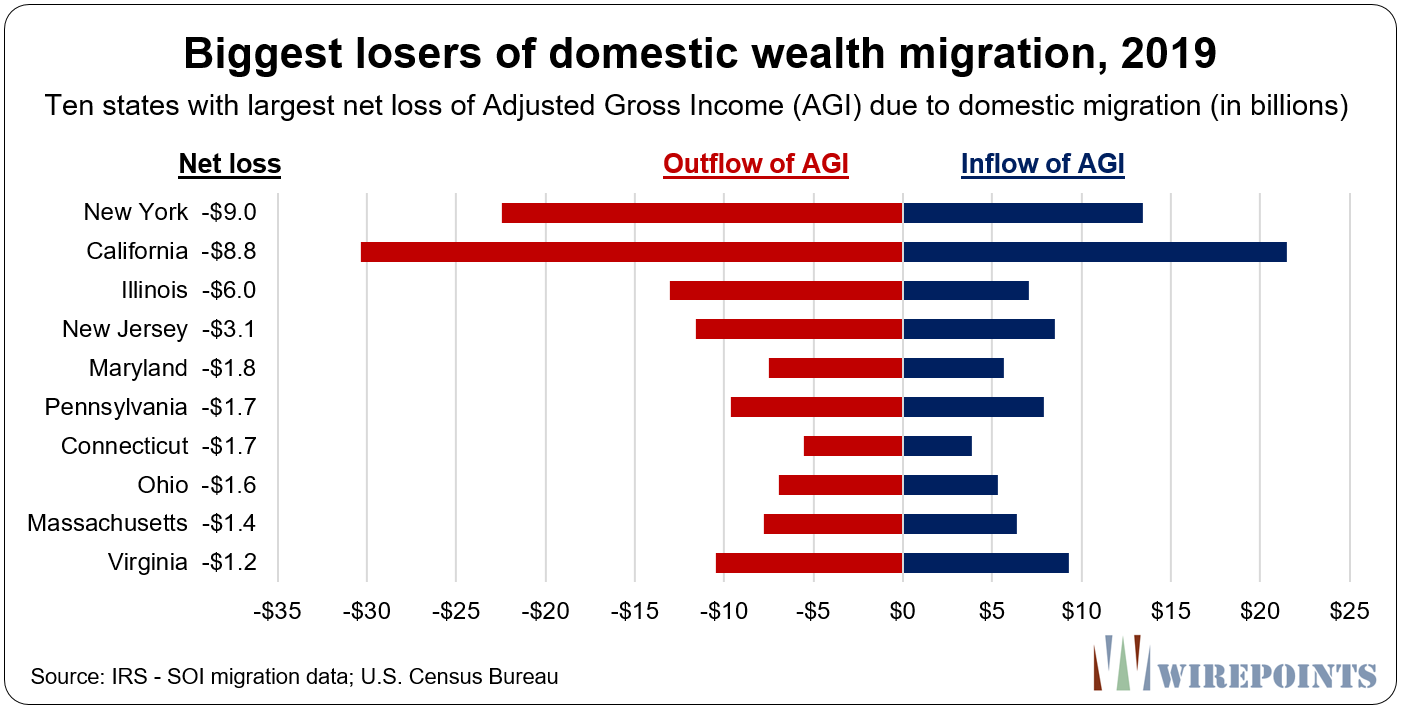 Tables with each state’s ranking in migration gains/losses are provided below.
Tables with each state’s ranking in migration gains/losses are provided below.
The cumulative impact of income losses and gains
The problem with chronic outflows, like in the case of New York, is that one year’s losses don’t only affect the tax base the year they leave, but they also hurt all subsequent years. The losses pile up on top of each other, year after year. And when a state loses income to other states for 19 straight years, the numbers add up.
In 2019 alone, New York would have had nearly $103 billion more in AGI to tax had it not been for the state’s string of yearly migration losses.
And when the state’s AGI losses are accumulated from 2000 to 2019, it totals $892 billion in cumulative lost income that could have been taxed over the entire period.
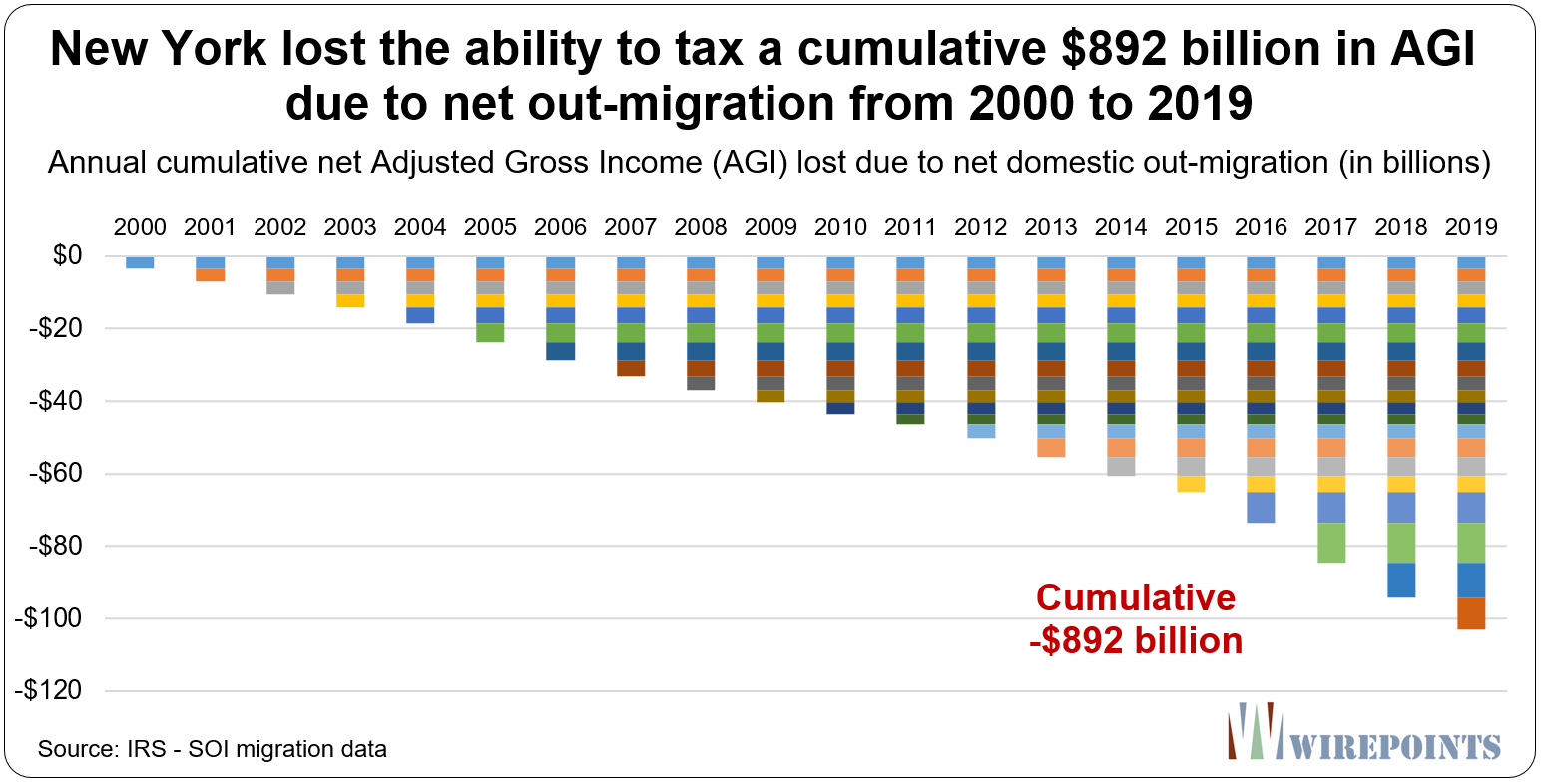 The opposite is true for migration winners like Florida. Gains in people and income pile on top of each other each year, building an ever-growing tax base. In 2019 alone, the state’s tax base was some $173 billion higher due to the 19-year string of positive income gains from net in-migration.
The opposite is true for migration winners like Florida. Gains in people and income pile on top of each other each year, building an ever-growing tax base. In 2019 alone, the state’s tax base was some $173 billion higher due to the 19-year string of positive income gains from net in-migration.
Even though Florida doesn’t tax incomes, Wirepoints also added up Florida’s cumulative AGI to make an apples-to-apples comparison with New York. When the Sunshine State’s AGI gains are accumulated from 2000 to 2019, it totals $1.4 trillion in income that could have been taxed over the entire period.
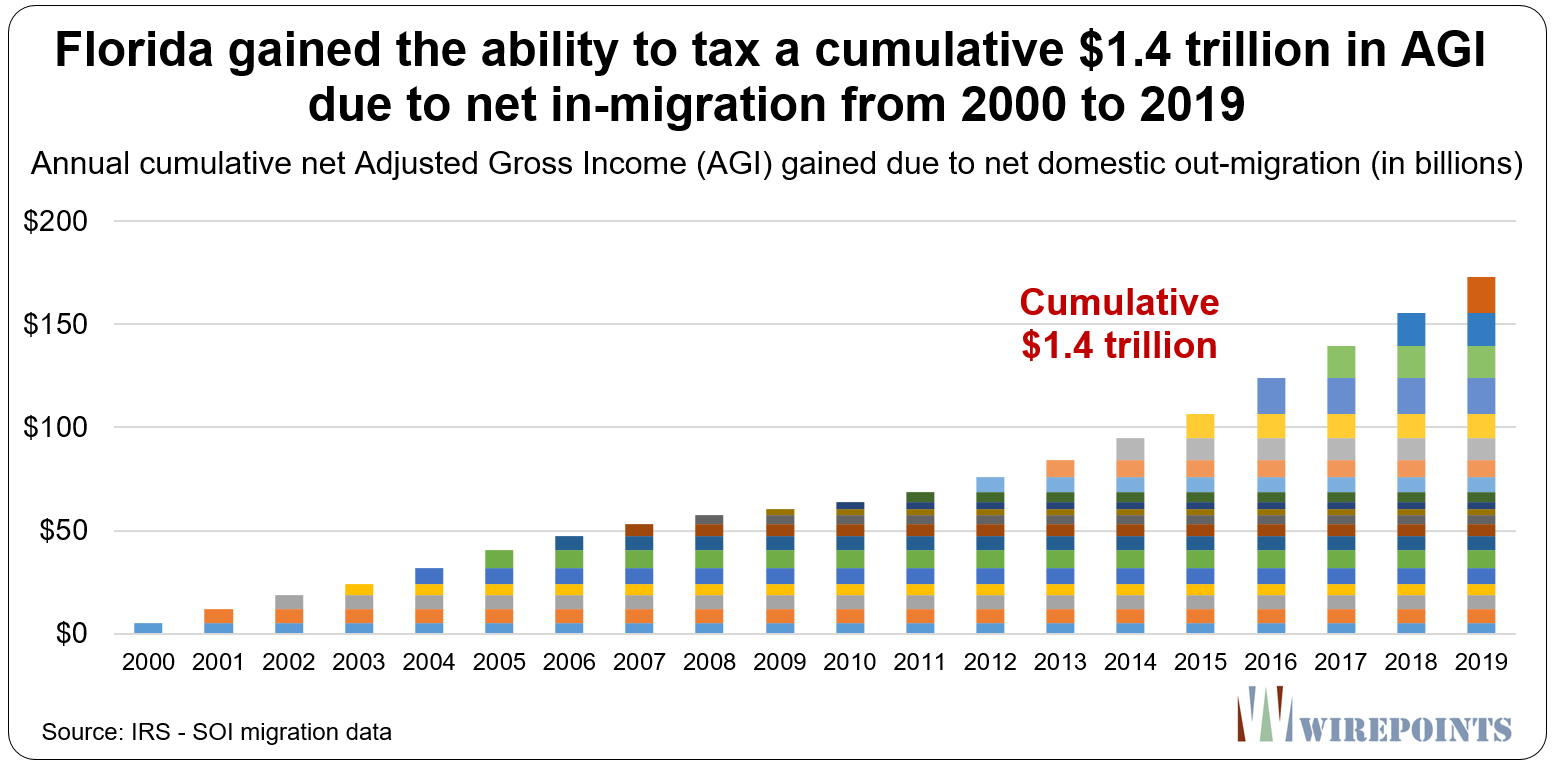 The competition for people matters
The competition for people matters
Illinois’ own experience with out-migration shows just how damaging being an “exit” state can be.
Based on a percentage of total income, Illinois ranked worst nationally for income losses in 2019. Illinois lost 1.41 percent of its 2018 AGI. Alaska and New York ranked second and third, with losses of 1.35 percent and 1.15 percent of their total incomes, respectively.
In contrast, Idaho was the nation’s big winner on a percentage basis in 2019, gaining 2.8 percent of its 2018 AGI base. The nation’s top five were rounded out by Florida, Nevada, Arizona and South Carolina.
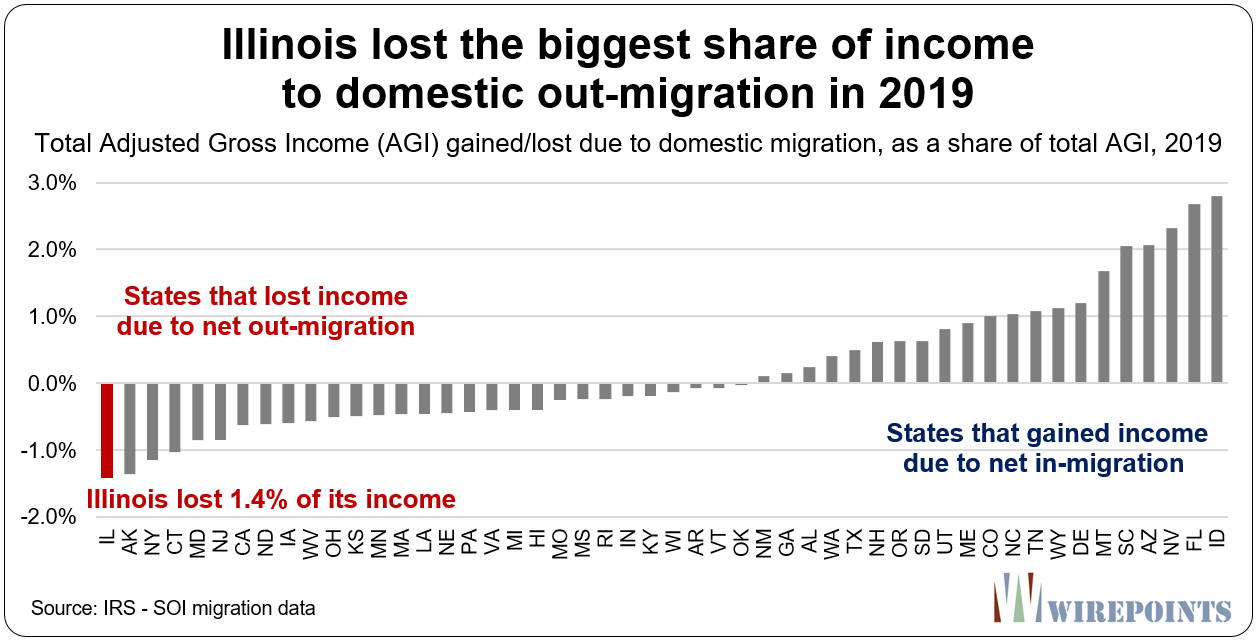 Illinois’ $6.0 billion AGI loss in 2019 wasn’t just a one-time thing. Wirepoints’ analysis found that, like New York, the state has netted annual losses of both resident and AGI every single year since at least 2000.
Illinois’ $6.0 billion AGI loss in 2019 wasn’t just a one-time thing. Wirepoints’ analysis found that, like New York, the state has netted annual losses of both resident and AGI every single year since at least 2000.
Florida’s gains and Illinois’ losses are a clear reminder that states are constantly competing for people, businesses and a growing tax base.
The prize for winning is big, but the price for losing may be even bigger.
Read more about migration and population changes across the nation:
- New IRS migration data: Illinois third-biggest loser of people, biggest loser of incomes, to other states in 2019
- The 2020 U.S. Census numbers were horrible for Illinois
- Leaving Illinois: Does anybody care about people like us?
- Leaving Illinois: One woman’s search for better opportunities in Atlanta
Appendix

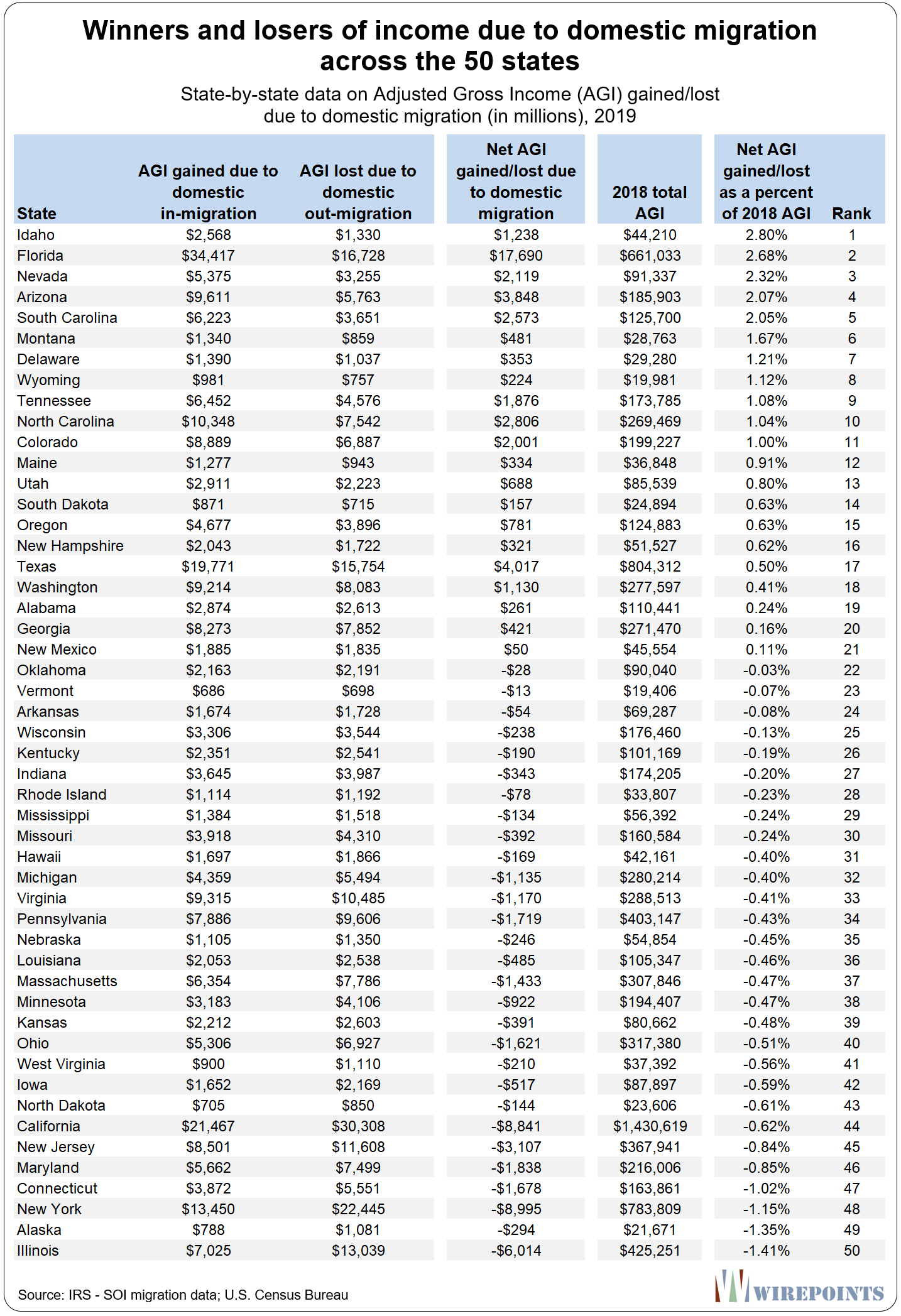
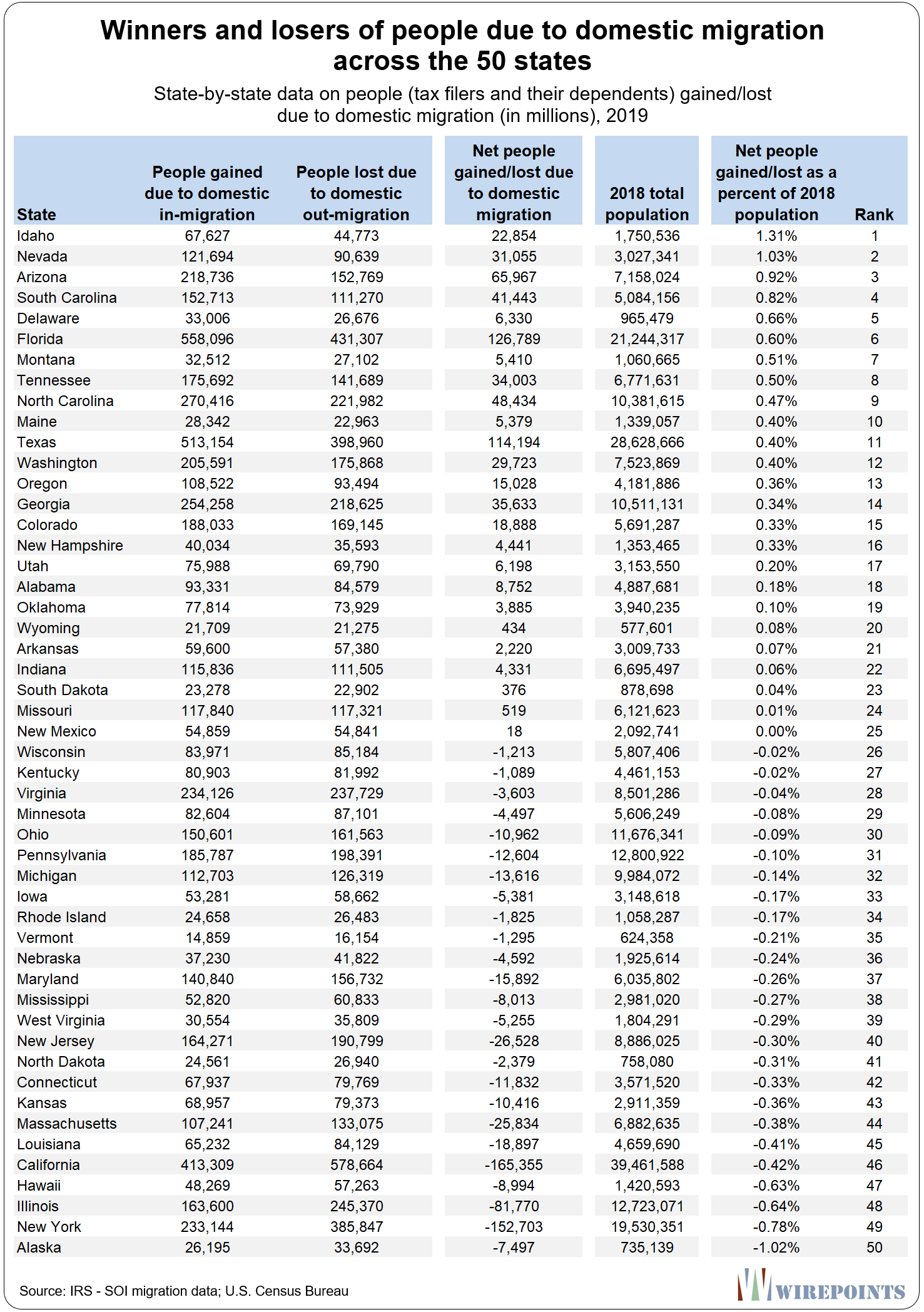
 Ted was on The Chicago Way with John Kass and Jeff Carlin to discuss the proposed $5 billion lakefront stadium project proposed by the Chicago Bears & Mayor Brandon Johnson, why Chicago is struggling compared to other metro areas across the country, why the city might or might not go the way of Detroit, and more.
Ted was on The Chicago Way with John Kass and Jeff Carlin to discuss the proposed $5 billion lakefront stadium project proposed by the Chicago Bears & Mayor Brandon Johnson, why Chicago is struggling compared to other metro areas across the country, why the city might or might not go the way of Detroit, and more.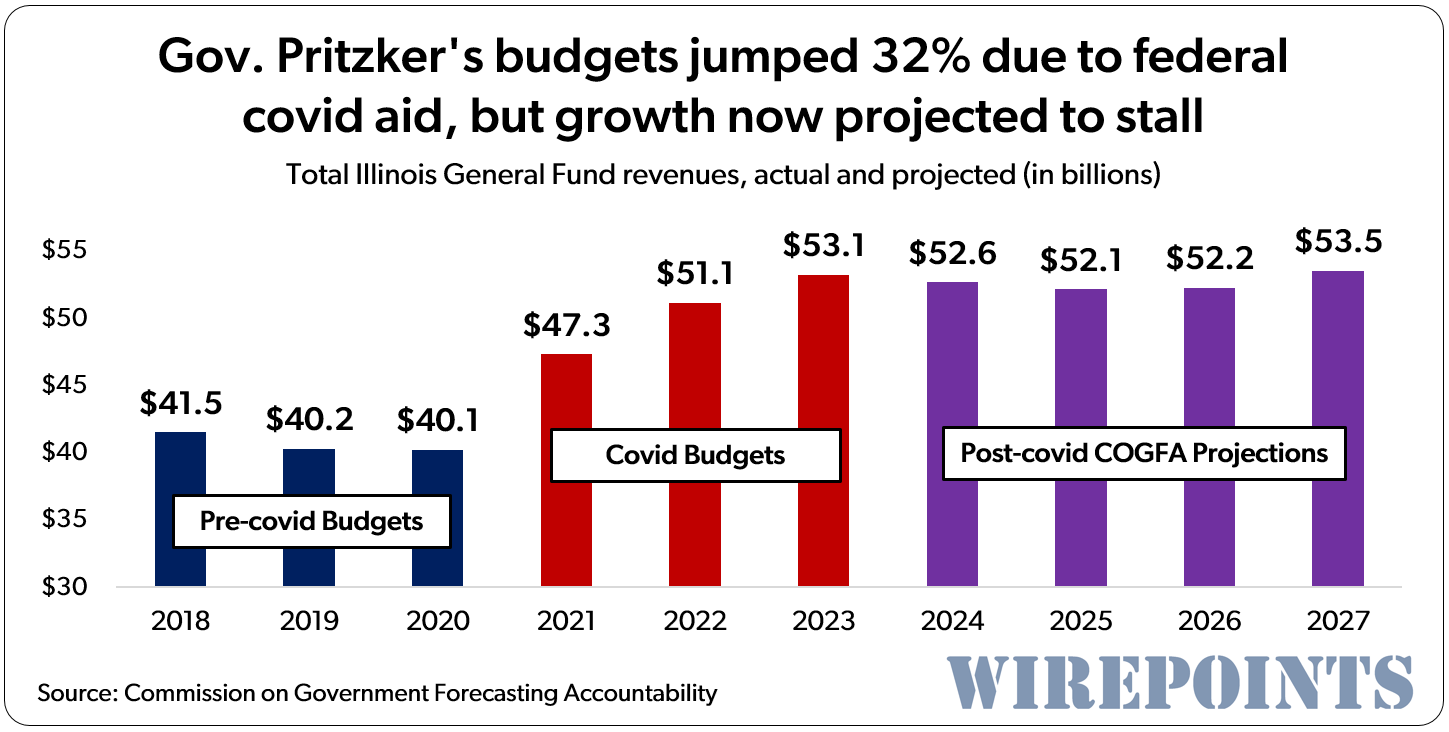 Some Illinois lawmakers continue to deny that covid aid and other federal stimulus bailed the state out of its fiscal mess. But a look at past and projected revenues from COGFA shows just how much the bailouts blew out the state’s revenues. And now that they’re over, how much harder it will be for Illinois revenues to grow.
Some Illinois lawmakers continue to deny that covid aid and other federal stimulus bailed the state out of its fiscal mess. But a look at past and projected revenues from COGFA shows just how much the bailouts blew out the state’s revenues. And now that they’re over, how much harder it will be for Illinois revenues to grow. Election integrity – both real and perceived – is essential to government’s legitimacy and stability. Illinois, like the rest of the nation, better fix its problems now.
Election integrity – both real and perceived – is essential to government’s legitimacy and stability. Illinois, like the rest of the nation, better fix its problems now. Ted joined Dan and Amy to talk about Chicago’s latest bond offering, why Chicago’s dismal home value growth is due to poor policies, the next $70 million to be spent on migrants, the 9% salary hikes demanded by the CTU, and why Illinois lawmakers voting to stop Chicago’s selective enrollment schools from being closed is hypocritical.
Ted joined Dan and Amy to talk about Chicago’s latest bond offering, why Chicago’s dismal home value growth is due to poor policies, the next $70 million to be spent on migrants, the 9% salary hikes demanded by the CTU, and why Illinois lawmakers voting to stop Chicago’s selective enrollment schools from being closed is hypocritical.
See https://www.cbpp.org/sites/default/files/atoms/files/10-20-14sfp.pdf for an explanation of why the “AGI migration” concept is flawed.
Great job pointing out the flaws of the outmigration data. This data has been dragged out year after year as gospel all the while Illinois total tax revenue collected continues to grow.
The other big loss for the state is of “those who volunteer”.
What the IRS data shows is the real cost of standing a state on it’s ear to pander to the whims of public employere unions – Very destructive behavior, devoid of any stewardship. The trend for Illinois leads to a dark, cold, cruel and desperate future. I’m sure those in leadership are counting on handouts.
Good job. Keep up the good work.
If the data is based on federal tax data, would it overstate the income loss to Illinois because Illinois does not tax retirement income? In other words, federal and state have different bases for taxation. A retiree who leaves Illinois isn’t paying state taxes income taxes. It doesn’t change the trajectory or the concerns related to population loss, however.
Most of Illinois population loss is made up of those in their working prime years. Seniors are not the majority. Don’t forget seniors still pay sales taxes, utility taxes, license fees, gasoline taxes, etc. Any net loss hurts.
Compounding AGI losses, like compounding debt, are bad. Real bad.
One of the only reasons retirees stay in Illinois is the fact that retirement income isn’t taxed. Watch thousands more leave when that changes.
Residents think IL is great because of no tax on retirement income. But the tax you pay in some states on retirement income is minuscule compared to your savings on property, sales, and gas taxes. By moving to SC, we are saving over $10K in property taxes vs maybe $100 tax on retirement income. Easy math.
I agree it always makes sense to look at the total tax picture. However there are plenty of current retirees that have pensions, social security and/or 401k distributions. Add them up and take 5% and it can be a sizable number. Enjoy SC, it’s a beautiful place to live.
Interesting data. No reason I’m aware of that current trends shouldn’t continue. Anyone looking to relocate should use this data as a tool for finding their new home. Nice job Wirepoints.